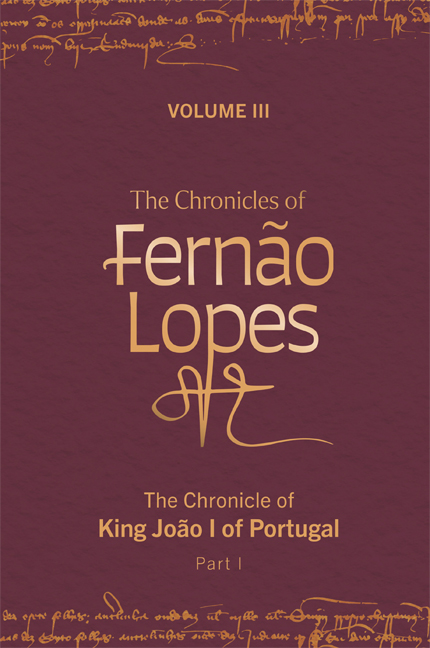Chapter 47 - Why the Master sent ambassadors to England, and concerning the reply which came back to him from that country
Published online by Cambridge University Press: 28 December 2023
Summary
Reason dictates that, when they wish to tackle a major undertaking, a large number of people can bring it to a conclusion better than can a small number, no matter how daring the latter may be. That is why the Master, along with his council, decided that it was best to have [other] forces to help him. They agreed to send a request to the King of England, asking him to see fit to give leave for soldiers of his kingdom to come as mercenaries, paid according to their wishes, to aid the Master against his enemies.
It was decided that Lourenço Martins, one of the Master's criados, who later became Governor of Leiria, and Thomas Daniel, an Englishman, should travel to England as envoys. They left the city aboard two naos in December [1383]. Afterwards, it was agreed to send Dom Fernando Afonso de Albuquerque, who was the Master of the Order of Santiago, and Lourenço Eanes Fogaça, who had been King Fernando's chancellor of the great seal and whom the Master dubbed knight in Lisbon cathedral before he left.
You should know that this Dom Fernando Afonso de Albuquerque, who had been in the town of Palmela, came with all his supporters to join the Master in Lisbon, greeting him as his lord and becoming a vassal in his service. However, despite this, as he had been made Master of Santiago by Queen Leonor and for fear that he might side with the King of Castile and hand over to him the fortresses which he held as Master of Santiago, it was declared wiser for him to go as an ambassador, to keep him at some distance from such an opportunity. Besides, since there was greater honour for the Master of Avis to be represented by such emissaries than by men of lower rank, they all agreed that he should go.
They embarked in two vessels, the Master of Santiago in a nao and Lourenço Eanes aboard a barge, completing their voyage a week later, on a Friday, when they landed at Plymouth, which is an English town. Having obtained horses there, they rode to London, where the king was to be found at that time.
- Type
- Chapter
- Information
- The Chronicles of Fernão LopesVolume 3. The Chronicle of King João I of Portugal, Part I, pp. 99 - 102Publisher: Boydell & BrewerPrint publication year: 2023



